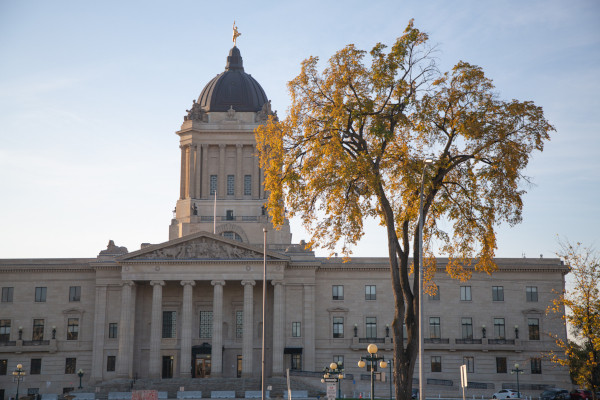Manitoba legislature to have land acknowledgement
PC approach criticized by many

On Sept. 16, interim Premier Kelvin Goertzen announced the formation of a working group to develop “recommendation for an Indigenous land acknowledgment to be used in the Manitoba Legislature,” according to a Progressive Conservative Caucus press release.
Land acknowledgements have become more commonplace since the Truth and Reconciliation Commission’s 2015 report but have existed previously.
Shawna Péloquin, a local activist and the University of Winnipeg Students’ Association community liaison director, says in a statement to The Uniter that a “land acknowledgement (re-asserts) our relation to the land and (acknowledges) the nations that have been caring for her for millenia.”
The working group is composed of three members, all Progressive Conservatives: Eileen Clarke (the chair), Greg Nesbitt and Andrew Smith. Clarke resigned from her position as Minister of Indigenous and Northern Relations earlier this year after then-Premier Brian Pallister made widely criticized remarks about Canada’s colonization.
This working group has been criticized, since none of the members are Indigenous (or publicly identify as such). Nahanni Fontaine, one of the NDP’s most prominent MLAs, took to Twitter to draw attention to this.
“The Premier just announced they’re undertaking ‘consultation’ on Land Acknowledgement in the House with three non-Indigenous Peoples at the helm of said process,” she tweeted.
“I’m sorry what?” she continued, “no invite extended to any of the 5 Indigenous MLAs in the Legislature to participate?”
There are, in fact, seven Indigenous MLAs: Fontaine, Amanda Lathlin, Wab Kinew, Bob Lagassé, Bernadette Smith, Ian Bushie and Alan Lagimodière.
Noticeably absent from the land acknowledgment working group is Lagimodière, Minister of Indigenous Reconciliation and Northern Relations, who defended residential schools earlier this year. The press release does note, however, that the working group will consult with “Manitoba Indigenous leadership and best practices in other Commonwealth Legislatures.”
Péloquin has some concerns about how this land acknowledgment is being implemented.
“When the government needs a taskforce to create (a) land acknowledgement, to me it means that they are (taking) more time and resources thinking about it rather than implementing land acknowledgement right away,” Péloquin says.
Furthermore, she emphasizes the importance of looking at concrete actions rather than empty words. “Land acknowledgment is performative if it (is) not intended to give the land back,” Péloquin says.
David Parent, assistant professor in the University of Manitoba’s Departments of Native Studies and History, agrees that the mainstreaming of land acknowledgments is, in many ways, detrimental to the plight of Indigenous peoples.
“The normalization of land acknowledgments continues now to contribute to the misrepresentation of Indigenous political authority and Indigenous sovereignty,” he says.
“A land acknowledgment is literally to acknowledge that you are on somebody’s territory, that you are external from that place and that you should be conducting yourself as such.”
“Having the government recognize that it is on the territory of someone else is also then recognizing that this isn’t their territory,” he says.
According to the Progressive Conservative Caucus press release, the working group “will provide a full report to the Government House Leader by Oct. 22, 2021 for consideration of the House Rules Committee.”
The Progressive Conservative Caucus has not returned The Uniter’s request for comment.
Published in Volume 76, Number 05 of The Uniter (October 7, 2021)






